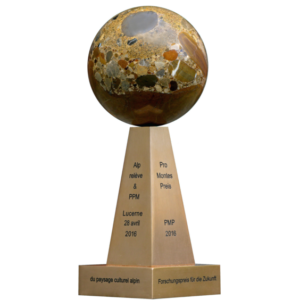ProMontesPrize 2016 – PMP 2016
For the future of the alpine cultural landscape

The ProMontesPrize of the Swiss Foundation for Alpine Research was awarded for the third time on April 28, 2016 in Luzern, during the Phil. Alp Conference of the Interacademic Commission for Alpine Studies, ICAS.
The winner is Benjamin Dietre, doctoral candidate at the Institute for Botany of the University of Innsbruck.
His work regarding the impact of pastoral agriculture on the biodiversity of the alpine landscape of the Lower Engadin during the past 10,000 years (”Einfluss der Weidewirtschaft auf die Biodiversität der alpinen Landschaft des Unterengadins während den letzten 10’000 Jahren”) (“Impact de l’agro-pastoralisme sur la biodiversité des paysages alpins de la Basse Engadine pendant les 10’000 dernières années.”) provides a meticulous look at the historical development of the alpine open habitats resulting from the rise of alpine pastoral agriculture.
Primarily with the aid of pollen analysis in peat bog layers, he was able to reconstruct the evolution of the Holocene vegetation for a period of more than 10,000 years for the region of the Silvretta Massif between Paznaun and the Lower Engadin. The natural climatic oscillations of the Holocene and the agricultural land use beginning 6,000 years ago during the Neolithic Period were identified as the greatest forces for change in the vegetation – also demonstrated by proxy data from soil studies and dendrochronology and the archaeological site above 1800 MAMSL. With the transition to the Bronze Age and later during the Roman Period and during the Medieval Warm Period, the percentage of cultivated land and thus the habitat for the fauna and flora of open landscapes increased continuously due to field cultivation and slash-and-burn land clearance.
The course of history seems to be reversing the trend of the alpine cultural landscape and its open habitats. We hope that this botanical-stratigraphic survey of the Holocene will shed light on what we stand to lose if we do not win the battle against the loss of agricultural land.
The ProMontes Prize, with a value of 5,000 Swiss Francs recognizes this research as an important contribution for safeguarding the future of the alpine cultural landscape. To encourage further research, this year, for the first time, the winner also receives project-related support in the form of 20,000 Swiss Francs, as long as a follow-up research project is submitted that fulfils the PMP criteria.